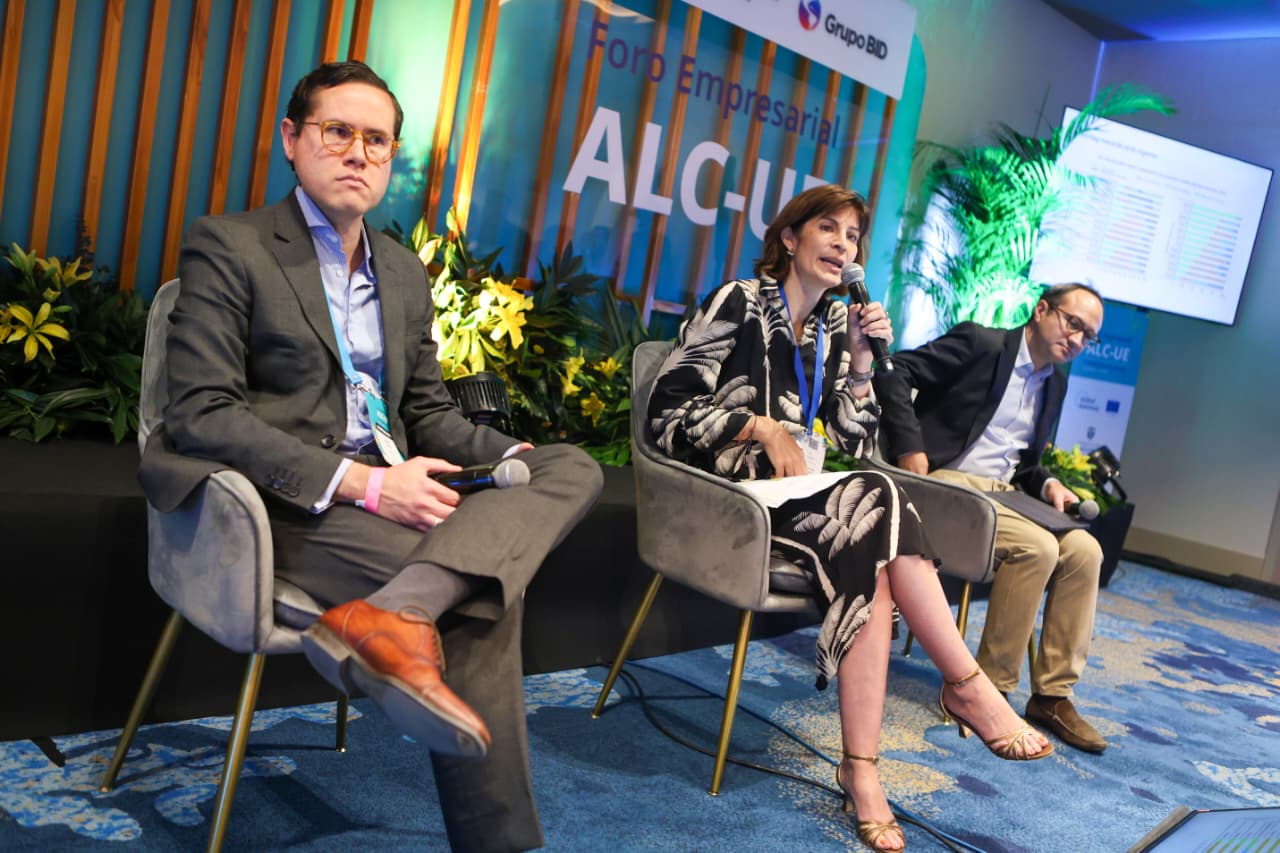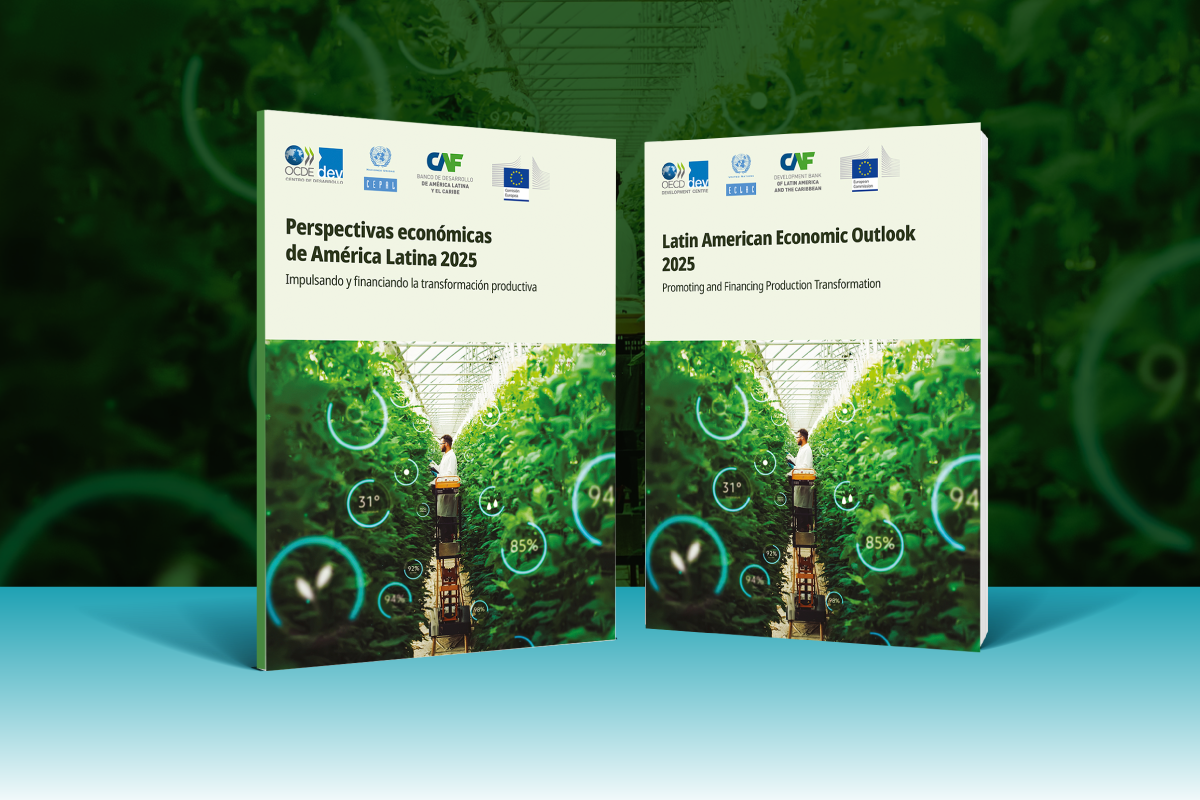Latin America and the Caribbean Must Scale Up and Improve its Productive Development Policies: LEO 2025 Report
Work area(s)
This joint document by the OECD, ECLAC, CAF and the European Commission – entitled the Latin American Economic Outlook (LEO 2025) – was presented at the Business Forum of the CELAC-EU Summit that is taking place in Santa Marta, Colombia.

To escape the trap of low capacity for growth in which it is caught, Latin America and the Caribbean must scale up and improve its productive development policies based on a new vision, experts from ECLAC, the Organisation for Economic Co-operation and Development (OECD), the European Commission and the CAF-Development Bank of Latin America and the Caribbean emphasized today upon presenting their joint report Latin American Economic Outlook 2025 (LEO 2025): Promoting and Financing Production Transformation.
The 18th edition of this publication was launched at a special event held in the framework of the LAC-EU Business Forum of the IV CELAC-EU Summit 2025, which is taking place in Santa Marta, Colombia. The presentation was made by Alejandra Botero, Manager of Investments and Financial Development at CAF-Development Bank of Latin America and the Caribbean; Marco Llinás, Director of the Production, Productivity and Management Division of the Economic Commission for Latin America and the Caribbean (ECLAC); and Sebastián Nieto Parra, Head of the Regional Development Dynamics Division at the OECD Development Centre.
Marco Llinás indicated that the new vision that should guide productive development policies in the region must include, among other things, working on strategic agendas around driving sectors, multilevel and multi-stakeholder collaborative efforts, and the promotion of cluster and other productive articulation initiatives. “Latin America and the Caribbean is not starting from scratch in terms of productive development efforts, there are numerous countries that have been implementing this type of policy. However, there are significant opportunities for improvement: national and subnational productive development policies, sustainable finance, institutional capacities and international cooperation must be articulated with a long-term vision and a territorial approach,” he emphasized.
The report’s presentation was preceded by welcome remarks from representatives of the main participating partners: Susana Sumelzo, State Secretary for Ibero-America and the Caribbean and Spanish around the World, of the Government of Spain; Natalia Irene Molina Posso, Director-General of the National Planning Department (DNP) of Colombia; Antonio Silveira, Vice President of the Private Sector at CAF; Myriam Ferrán, Deputy Director-General for International Partnerships of the European Commission; and Mathias Cormann, the OECD’s Secretary-General (via video).
The report presents a series of policy recommendations for reconfiguring the region’s production structure, making it more sustainable and inclusive, and it examines the financing mechanisms needed to underpin this transformation. It sustains that governments should design and implement development strategies that would enable each country to generate formal employment, strengthen local capabilities and promote strategic sectors, aligning their production structure with global standards and demands. Its recommendations include improving the implementation of productive development policies, deploying innovative financial instruments, renewing the role of development finance institutions, and revitalizing international partnerships to accelerate the mobilization of international resources into strategic sectors and to support capacity strengthening.
In her remarks, Susana Sumelzo stressed that “among the many challenges we have in a complex context, with significant political and economic turbulence on an international level that often threatens regional stability, one of the major challenges is finding suitable financing mechanisms to meet countries’ needs and drive their development.” In light of this, she stressed the report’s relevance year after year.
Meanwhile, Natalia Molina argued that the study being presented today comes at a crucial time. “Fostering and reinforcing an increase in regional productivity continues to be one of the greatest challenges of our time and is an urgent task. Productivity not only determines our competitiveness, but also our ability to create decent employment, reduce inequality and ensure opportunities for all citizens,” she stated.
Antonio Silveira underlined the message of cooperation contained in the report. “International partnerships, the defense of multilateralism and regional integration are absolutely central pillars. Despite all the differences we have, we must work in this direction, and the new edition makes that clear,” he said.
Myriam Ferrán, meanwhile, indicated that this report reminds us that Latin America and the Caribbean has enormous potential: abundant natural resources, human talent, innovative ecosystems and a growing commitment to sustainability. “However, there are many challenges: ongoing informality, productivity challenges and the need to strengthen institutional and financial capacities to support this productive transformation are among the aspects identified in the document,” she added.
In his video message, the OECD’s Secretary-General, Mathias Cormann, explained that the LEO 2025 recommends ambitious reforms to boost investment and unlock new sources of financing for development and growth.
During the report’s presentation, Alejandra Botero stressed that “it is increasingly evident that we cannot think about productive development, diversification and growth without doing so in a comprehensive way, with sustainability and inclusion.”
Finally, Sebastián Nieto stated that “we need some key elements of regional cooperation for the productive transformation to be sustainable and inclusive: technology transfer; more policy exchanges that foster knowledge and spending on R&D; harmonization processes in regulations; and sharing public policy experiences for preserving the region’s biodiversity, but also for harnessing it to create employment.”
The event launching the LEO 2025 also featured a roundtable discussion with participation by authorities from the Government of Panama along with specialists from the Inter-American Development Bank (IDB), the Ibero-American Social Security Organization (OISS), Bancóldex, APRIMIN Chile, and the Board of Directors of the PRISA.
More details on what is addressed in the Latin American Economic Outlook 2025 (LEO 2025) report can be found in the following press release.
Related content

The OECD, European Commission, CAF and ECLAC Advocate for a New Vision for Productive Development Policies in Latin America and the Caribbean
In a document that will be presented on Monday, November 10 at the Business Forum of the CELAC-EU Summit in Santa Marta, Colombia, the entities pose the need to scale up and improve these…
Type
Country(ies)
- Latin America and the Caribbean
- Europe
Contact
Public Information Unit
- prensa@cepal.org
- (56 2) 2210 2040